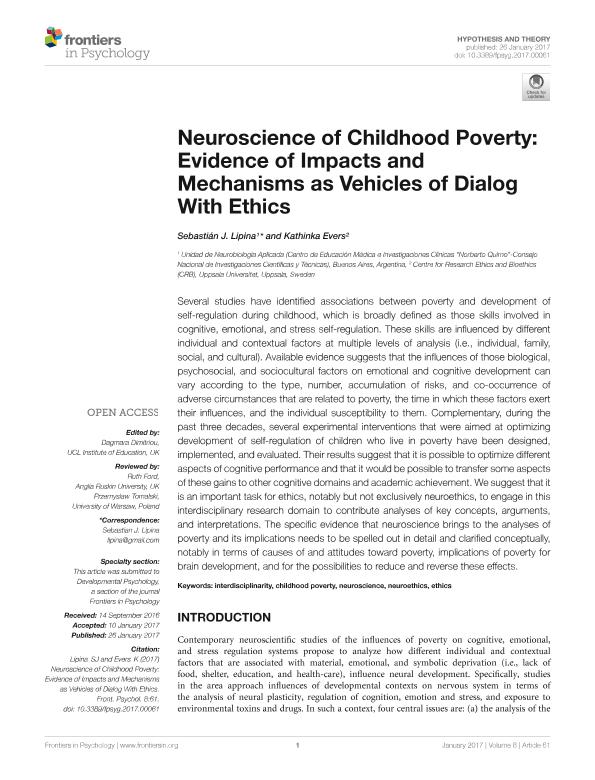Mostrar el registro sencillo del ítem
dc.contributor.author
Lipina, Sebastián Javier

dc.contributor.author
Evers, Kathinka
dc.date.available
2018-03-27T15:50:03Z
dc.date.issued
2017-01
dc.identifier.citation
Lipina, Sebastián Javier; Evers, Kathinka; Neuroscience of childhood poverty: Evidence of impacts and mechanisms as vehicles of dialog with ethics; Frontiers Research Foundation; Frontiers in Psychology; 8; 61; 1-2017; 1-13
dc.identifier.issn
1664-1078
dc.identifier.uri
http://hdl.handle.net/11336/40142
dc.description.abstract
Several studies have identified associations between poverty and development of self-regulation during childhood, which is broadly defined as those skills involved in cognitive, emotional, and stress self-regulation. These skills are influenced by different individual and contextual factors at multiple levels of analysis (i.e., individual, family, social, and cultural). Available evidence suggests that the influences of those biological, psychosocial, and sociocultural factors on emotional and cognitive development can vary according to the type, number, accumulation of risks, and co-occurrence of adverse circumstances that are related to poverty, the time in which these factors exert their influences, and the individual susceptibility to them. Complementary, during the past three decades, several experimental interventions that were aimed at optimizing development of self-regulation of children who live in poverty have been designed, implemented, and evaluated. Their results suggest that it is possible to optimize different aspects of cognitive performance and that it would be possible to transfer some aspects of these gains to other cognitive domains and academic achievement. We suggest that it is an important task for ethics, notably but not exclusively neuroethics, to engage in this interdisciplinary research domain to contribute analyses of key concepts, arguments, and interpretations. The specific evidence that neuroscience brings to the analyses of poverty and its implications needs to be spelled out in detail and clarified conceptually, notably in terms of causes of and attitudes toward poverty, implications of poverty for brain development, and for the possibilities to reduce and reverse these effects.
dc.format
application/pdf
dc.language.iso
eng
dc.publisher
Frontiers Research Foundation

dc.rights
info:eu-repo/semantics/openAccess
dc.rights.uri
https://creativecommons.org/licenses/by/2.5/ar/
dc.subject
Childhood Poverty
dc.subject
Ethics
dc.subject
Interdisciplinarity
dc.subject
Neuroethics
dc.subject
Neuroscience
dc.subject.classification
Psicología

dc.subject.classification
Psicología

dc.subject.classification
CIENCIAS SOCIALES

dc.title
Neuroscience of childhood poverty: Evidence of impacts and mechanisms as vehicles of dialog with ethics
dc.type
info:eu-repo/semantics/article
dc.type
info:ar-repo/semantics/artículo
dc.type
info:eu-repo/semantics/publishedVersion
dc.date.updated
2018-03-27T14:49:50Z
dc.journal.volume
8
dc.journal.number
61
dc.journal.pagination
1-13
dc.journal.pais
Suiza

dc.journal.ciudad
Berna
dc.description.fil
Fil: Lipina, Sebastián Javier. Consejo Nacional de Investigaciones Científicas y Técnicas. Oficina de Coordinación Administrativa Parque Centenario. CEMIC-CONICET. Centro de Educaciones Médicas e Investigaciones Clínicas "Norberto Quirno". CEMIC-CONICET.; Argentina
dc.description.fil
Fil: Evers, Kathinka. University Of Uppsala; Suecia
dc.journal.title
Frontiers in Psychology
dc.relation.alternativeid
info:eu-repo/semantics/altIdentifier/url/http://journal.frontiersin.org/article/10.3389/fpsyg.2017.00061/full
dc.relation.alternativeid
info:eu-repo/semantics/altIdentifier/doi/http://dx.doi.org/10.3389/fpsyg.2017.00061
Archivos asociados
